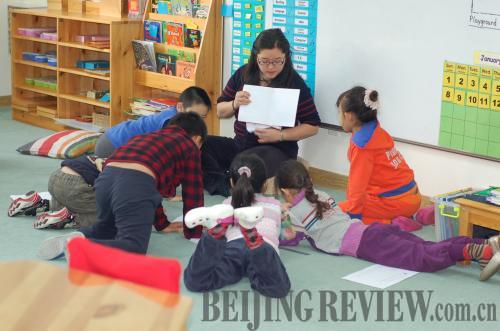|
 |
|
GROUP STUDY: A teacher instructs students at the International Montessori School of Beijing (COURTESY OF THE INTERNATIONAL MONTESSORI SCHOOL OF BEIJING) |
Wang is not a very insistent person. When it comes to presentations he does hog the spotlight – he yields the stage to his employees and remains shyly in the background.
Although financially secure since a young age, the question of how to properly educate his daughter kept him up at night.
State-owned kindergartens were out of question. However, on his journeys all around the world, Wang spotted an education system that piqued his interest: Montessori. He decided to start his own. Wang made enquiries and called experts around Europe, inviting them to collaborate on his vision.
In her apartment in Paris, Neige Cohendy received a call at 2 a.m. On the other end of the line, Wang asked if she would like to be part of the foundation of a new Montessori kindergarten. Cohendy accepted. A week later she presented their concept to parents in Beijing. In China, things work fast.
The rooms, shown to the parents, are polished, almost sterile. Furniture and teaching materials have been specially manufactured. Entering the kindergarten on the third floor of a business building in Chaoyang District, one rather gets the impression of standing in reception of a hotel. In this place the high-tech version of an alternative educational approach is realized, an approach that originated over one hundred years ago.
'Help me to do it by myself!'
Being one of the first female physicians with a doctorate, 26-year-old Maria Montessori worked in a hospital for mentally disabled children. After a while, Montessori developed some practical teaching methods and materials and was able to prove that the children's alleged mental illnesses were attributed to pedagogic errors.
Materials play an important role in the Montessori system. The kids learn through play how to count (with small balls), how to read (by following the letters with their fingers) and even how to behave and interact with their social surroundings (when eating together).
"The materials shall always attract children's curiosity. After all, they shall learn on their own and make experiences by themselves," explained Naz Abdullah, who had already been working in England and Mozambique as an educator and now is member of Wang's staff.
With that, Naz Abdullah gave voice to a central tenet of Montessorian theory: the focus lies on the child himself/herself, with all his/her interests, his/her circadian routine and his/her special way of learning.
There is no teacher in a traditional sense. Instead of giving instructions, the educators offer their help and advice to children. They often even take the second place behind the classmates from different age groups supporting each other.
"Having to decide for them what to do, the kids must also be able to reach everything without difficulty," Naz Abdullah said and pointed on the small shelves, on which the materials were perfectly set up.
With the words "Help me to do it by myself," Maria Montessori summarized the relationship between children and educators. This idea is based on a complex conception of human beings, on a philosophy of children as perfect individuals, who might learn and develop best without criticism and interference. How exactly this philosophy shall be implemented, however, is now causing quarrels.
A war of beliefs
In the classrooms of the International Montessori School of Beijing (MSB), the atmosphere in each of the rooms was attentive and enthusiastic.
In front of the small shelves, at tables and on small stools sit pupils, gathering in small groups or working for themselves. One could even thought they played, given to their dedication to the materials. Nevertheless, in between the pupils there were always four educators that led things in the right channels. After all, children come to school in order to learn.
During a tour, Isabelle Meyers, Director of Communications at the school, talked of concepts, ideas, and the philosophy of Maria Montessori. Then she turned to talk about the other Montessori schools and kindergartens opening all around China.
| 